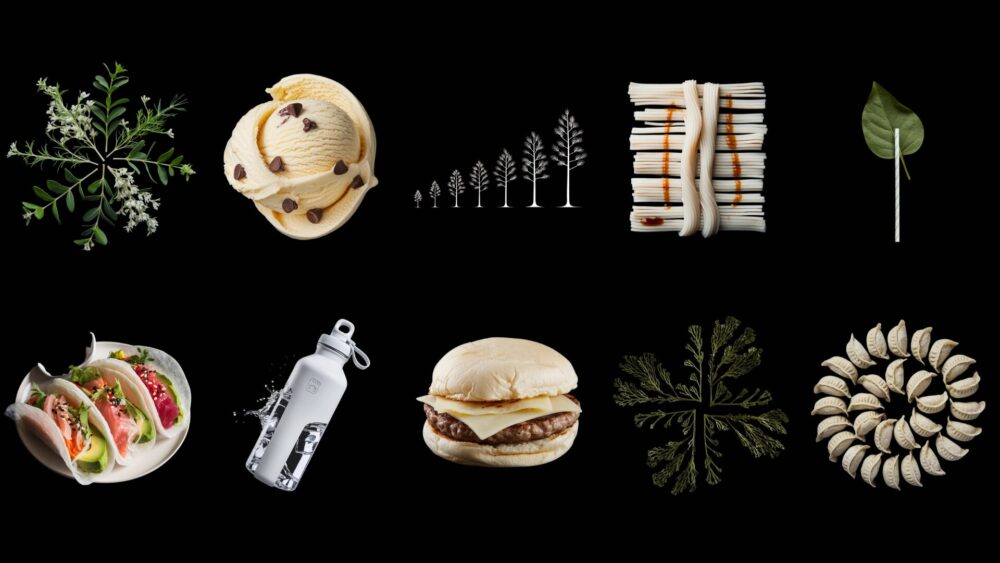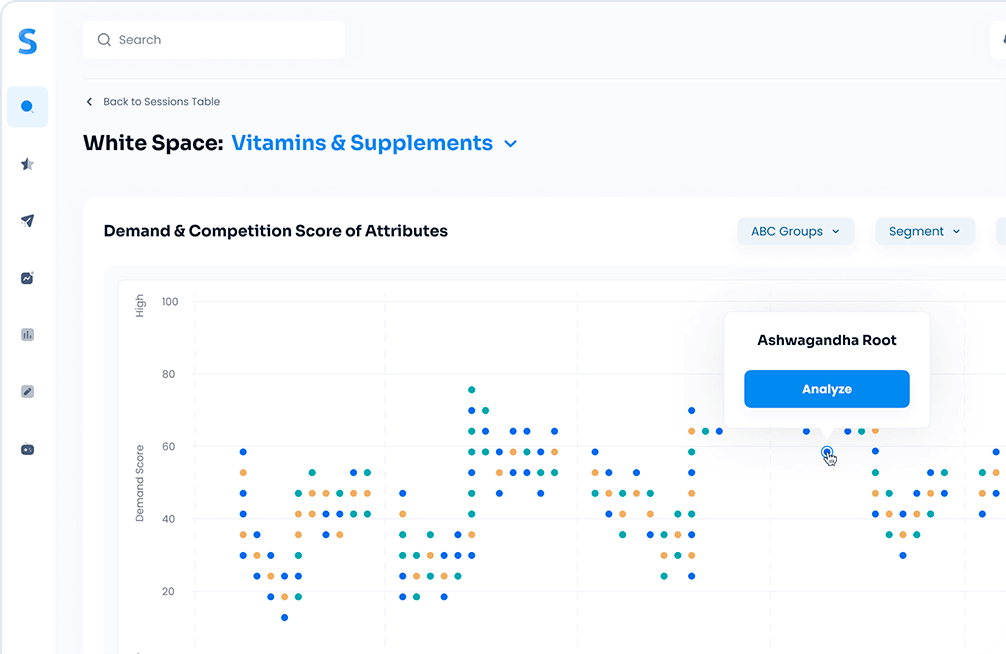Everyone in consumer products understands that sustainability means different things to different consumers. In laundry detergent, consumers care more about the recyclability of big, very noticeable plastic jugs than they do about the less-visible discharge of phosphates into waste water. Savvy marketers know consumers will agree that lots of sustainability topics matter to them, but in reality only a small portion of those topics actually influence their purchase behavior.
One of the trickiest categories is coffee, because sustainability ladders up to also include social issues like fair trade. For those businesses it encompasses both the “E” and the “S” of ESG (Environmental, Social, and Governance) standards. We can reapply learnings from coffee into other food, beverage, beauty, and personal care categories where ingredients tend to matter to consumers.
In this article we’ll explore the intersection between sustainability and consumer preferences in the American coffee market. We’ll look at the real-time data we have in Simporter and examine how new trends and preferences shape consumer choices and product development.
Then, using current trends, we’ll predict the future of sustainability in coffee.
The American Coffee Culture and Sustainability
The American coffee culture has evolved drastically over the years. Once dominated by mass-market brands, there’s of course a longstanding, growing preference for specialty coffee, which is often associated with sustainable practices. Consumers are more aware than ever of the environmental impact of their choices, and this awareness is driving demand for sustainably sourced coffee.
Historically, coffee consumption in the U.S. was primarily about convenience. However, today’s consumers are looking for quality, ethical sourcing, and environmental responsibility. An interesting fact that ties history and sustainability together is the resurgence of shade-grown coffee, a method that was more common before the industrialization of coffee farming and is now seen as a way to promote biodiversity.
Shade-grown coffee is grown under taller trees, mimicking its natural environment. This method creates a farm resembling a forest, with various trees and plants providing shade to keep coffee plants cool and protected from too much sun. This setup benefits wildlife by offering homes for birds and insects, enriches the soil with fallen leaves, reduces the need for pesticides, helps prevent deforestation, and conserves the water by reducing evaporation from the soil. Some consumers believe it tastes better due to the slower growth of the beans.
According to data collected on Simporter’s white space platform, the market has responded. Compared to the average “attribute” in the coffee category, shade-grown indexes higher in terms of the number of products and brands that claim it, and the volume of consumer reviews mentioning it. It’s not quite Instagram famous, and Google searches are lower than the category average, but overall it’s on the upswing. When our AI tool aggregates all the interest in shade-grown among both brands and consumers, it scored 80 out of 100 for relevance.
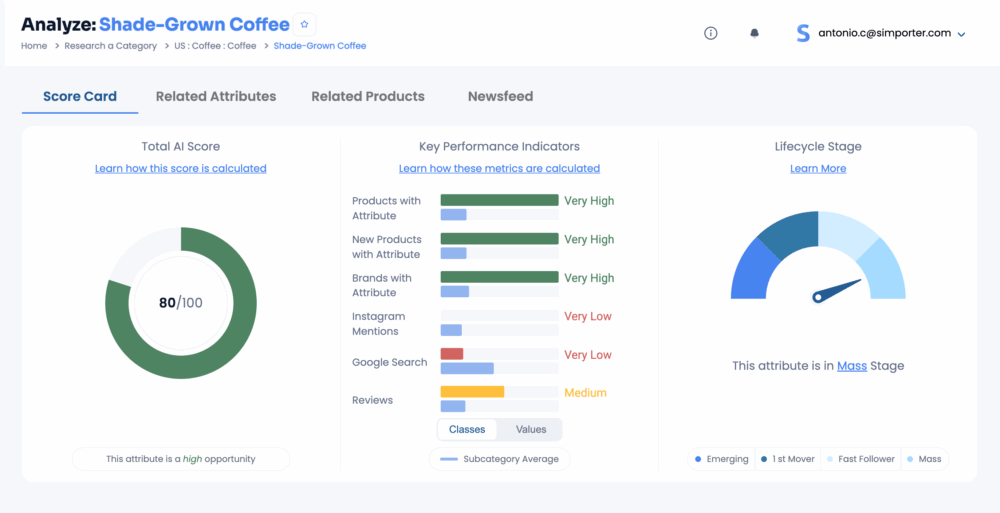
When looking at just sustainability topics within the coffee category, Shade-grown ranks in the top 3.
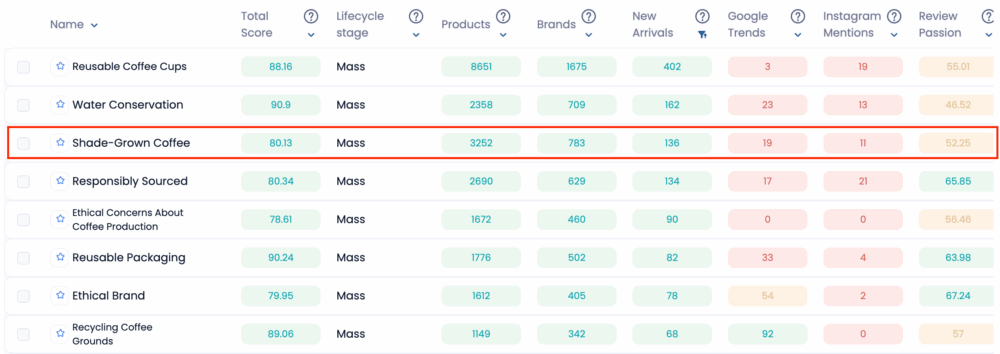
Key Sustainability Concerns for American Coffee Drinkers
In the United States, sustainability has firmly established itself as a critical consideration for coffee drinkers. Our analysis reveals that sustainability attributes such as “Water Conservation,” “Waste Reduction in Coffee Shops,” “Reusable Packaging,” and “Responsibly Sourced” products are not just passing trends but crucial factors that are driving consumer choices.
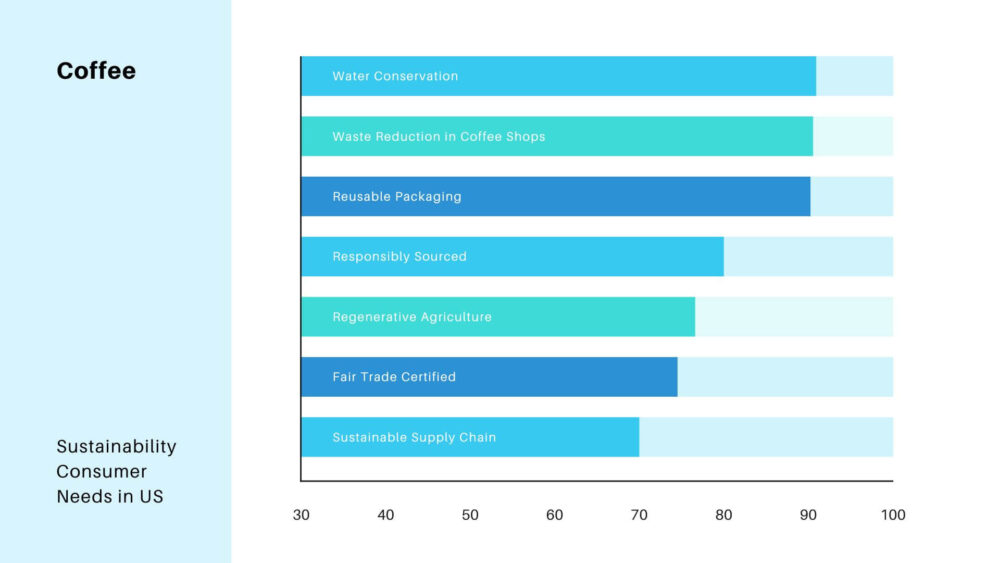
Consumer Priorities: American coffee consumers prioritize sustainability across various dimensions. “Water Conservation” stands out as a crucial concern, reflecting a heightened awareness of water scarcity issues and the environmental impact of coffee production. Consumers actively seek products that minimize water usage throughout the supply chain, from cultivation to brewing.
Waste Reduction: The emphasis on “Waste Reduction in Coffee Shops” underscores a commitment to minimizing environmental footprint. Consumers are increasingly drawn to coffee shops and brands that implement strategies to reduce waste, whether through compostable packaging, recycling programs, or innovative reuse initiatives.
Packaging Preferences: “Reusable Packaging” has gained significant traction as consumers gravitate towards options that minimize single-use plastics and promote sustainable packaging solutions. Brands that offer reusable containers or eco-friendly packaging alternatives resonate strongly with environmentally conscious consumers.
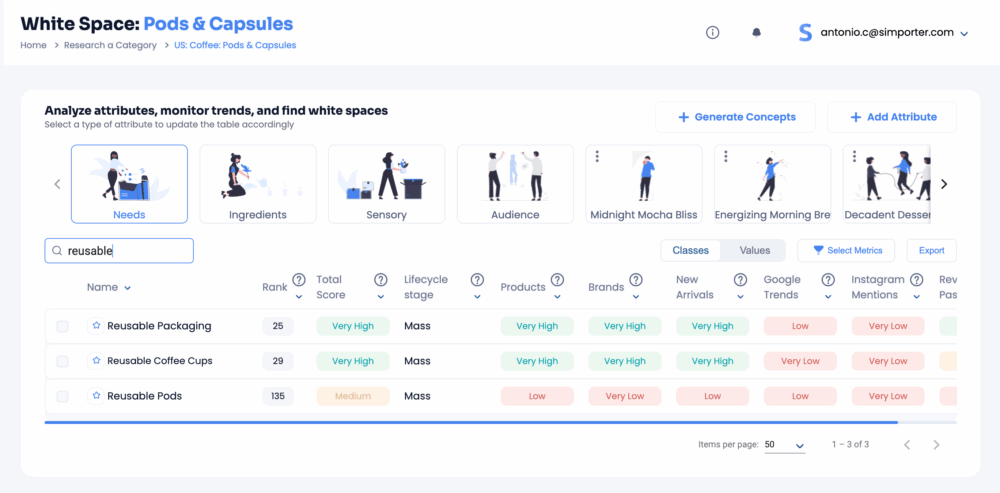
Ethical Sourcing: “Responsibly Sourced” coffee, which ensures fair treatment of farmers and sustainable farming practices, remains a cornerstone of consumer preferences. Ethical considerations, including fair trade certifications and transparent supply chains, play a pivotal role in shaping consumer trust and loyalty towards coffee brands.
Passionate Consumer Base: The data indicates not only a preference but also a passion among American coffee drinkers for sustainability attributes. High engagement levels on social media platforms, enthusiastic eCommerce reviews, and extensive search queries reflect a deeply rooted consumer commitment to supporting businesses that prioritize environmental and social responsibility.
Comparison with Other Countries
We’ve compared data from the US with the data from Canada, the UK, and Australia. There are a lot of commonalities between markets (as that’s the case with any similarly developed markets), but some distinctions are noticeable.
For example, US markets have a much faster adoption rate of new trends. This can be seen in the number of products and brands that are focusing on important sustainability needs such as water conservation, responsibly sourced coffee, reusable packaging, and others.
One major difference between the US and Canada, compared to the UK and Australia, is the Fair Trade Certification. Brands get Fair Trade certification by meeting rules for fair wages, safe working conditions, and sustainable farming. They apply to organizations like Fairtrade International, Fair Trade USA, and the World Fair Trade Organization, which check if they follow these rules. These groups work globally, so brands from anywhere, like the UK and Australia, can get certified. This helps make sure products are made fairly and sustainably, benefiting everyone involved.
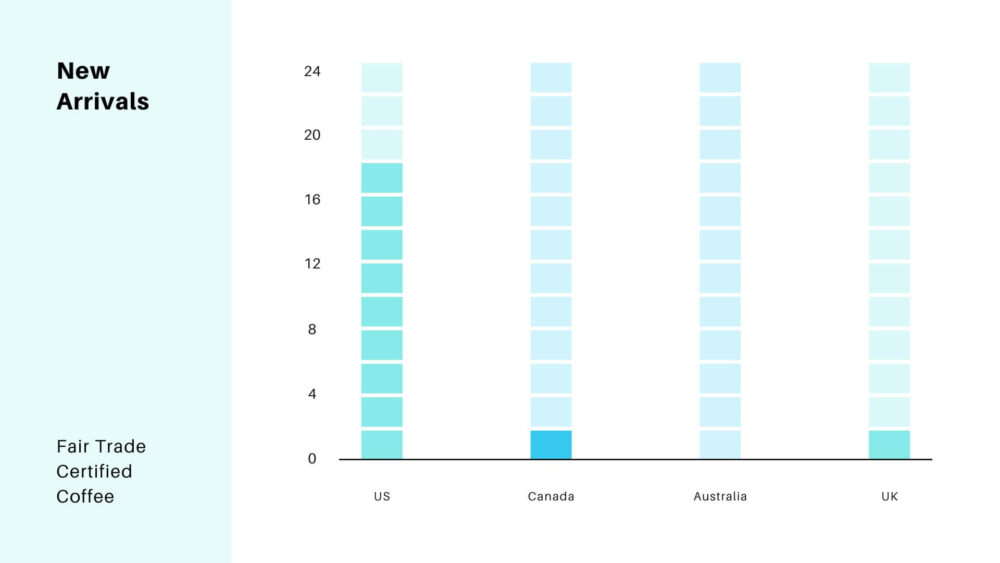
While we see there’s a lot of talk about it in the US and Canada on social media, and even a lot of consumers search for it on Google, in the UK and Australia fair trade isn’t in that high demand. This is especially noticeable in Australia where we couldn’t find any new product with it, while there 19 new products in the US spotting fair trade certificates. If we analyze this further and compare it to Canada and the UK, where only 2 new products had fair trade certification, it further confirms that the US is a trend-setter market for coffee.
What Role Will Sustainability Play in the Future of Coffee?
As consumer priorities continue to evolve, sustainability will play an even more critical role in the future of coffee. Potential future shifts include increased demand for transparency in sourcing and a stronger emphasis on regenerative farming practices. Consumers will likely expect more from brands in terms of environmental and social responsibility.
Emerging trends in sustainable coffee production include innovations in processing techniques that reduce water usage and carbon emissions. Additionally, there is growing interest in closed-loop systems where waste products are repurposed within the production cycle.
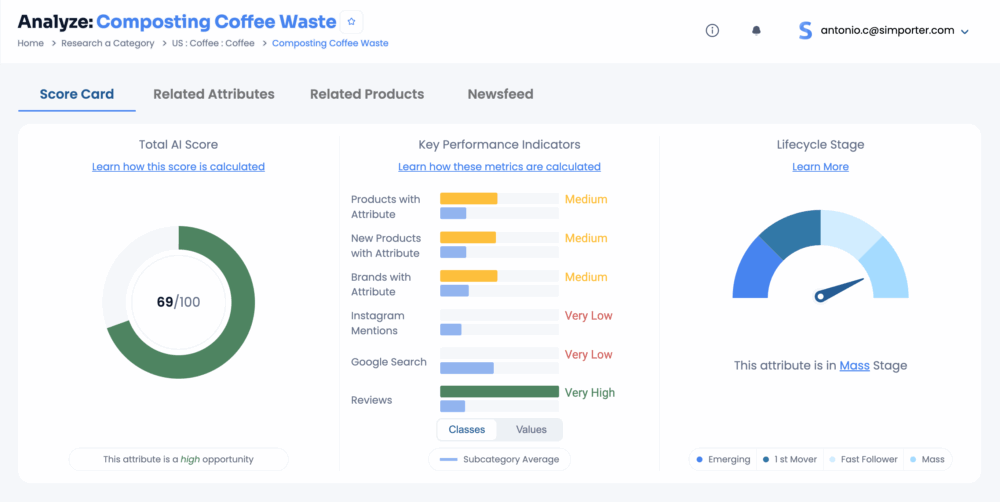
Expert predictions from industry leaders suggest that technological innovations, such as blockchain for traceability and AI for optimizing farming practices, could become widely adopted. These technologies not only enhance sustainability but also improve product quality and supply chain efficiency.
Simporter enables companies to stay ahead of these trends by providing insights into consumer data and emerging technologies. By using Simporter’s forecasting capabilities, businesses can predict sales and incremental sales before launching new products, ensuring they are meeting future consumer demands effectively.
Final Thoughts on Sustainability in Coffee
Sustainability is no longer a nice-to-have; it’s a must-have for any coffee brand looking to succeed in today’s market. Consumers are increasingly making choices based on a product’s environmental and social impact, and businesses need to respond to these demands.
To support sustainability, consumers can take practical steps such as choosing products with ethical certifications and supporting brands that prioritize environmental responsibility. On the industry side, companies should continue to push for sustainable practices throughout their supply chains, from sourcing to packaging.

